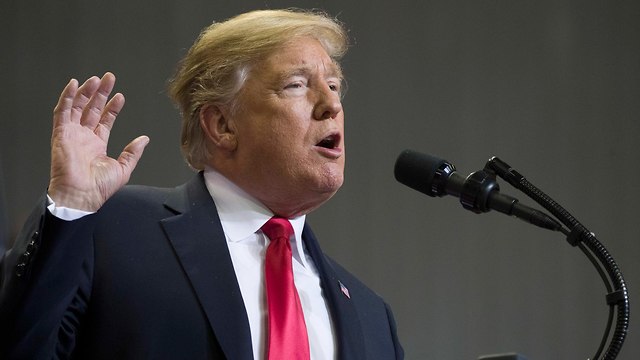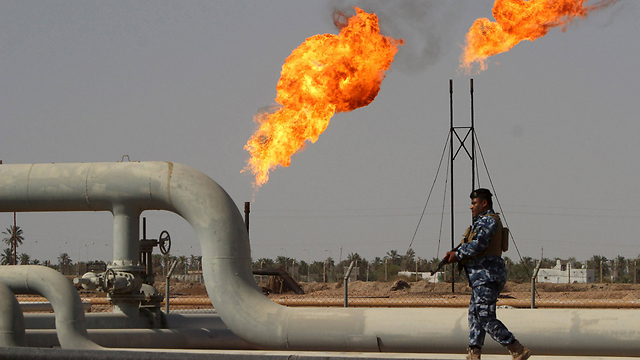
Trump’s statements on Israel will boomerang
Analysis: ‘Blaming’ US Mideast policies on Israel's security’ needs won’t end well; Gulf states actually need Israel more than Israel needs them; Stability of the global economy is the reason for continued US interest in the region.
The common practice of US President Donald Trump to "bend" facts and adapt them to the media narrative he wants is nothing new, and should primarily be of concern to the citizens of his country. But recently, the US president has adopted a posture of “fake news” which should concern us as well.
A prominent example was last week in Trump's conversation with journalists about Thanksgiving, in which he tried to explain why the United States should not punish Saudi Arabia and Saudi Crown Prince Muhammad bin Salman (MBS) for the murder of Jamal Kashoggi. Despite the fact that the CIA determined that it was very likely that MBS was responsible for the horrific murder of the journalist, a critic of the regime. Trump claimed that the conclusions of his country's intelligence agency were not absolute, and then he also drew the Israel card from up his sleeve.
"Without Saudi Arabia, Israel will be in great trouble," Trump said, hinting that he, the president of the United States, might have considered cooling relations with MBS and Saudi Arabia over the murder at the Saudi embassy in Turkey, but his commitment to Israel’s security had his hands tied.
This is because Israel's security is a higher priority than the traditional American commitment to respect international law, human morality and human rights. Ostensibly, the Israeli government and its citizens are entitled to be satisfied and feel more secure after the protective statements by President Trump. However, a closer examination of the facts and the significance of the declaration should give us the opposite feeling.
First, because Saudi Arabia does not significantly contribute to the national security of the State of Israel apart from one issue: Iran is the common enemy of Israel, Saudi Arabia and the other Gulf states, while the United States is the patron of Saudi Arabia and the moderate Sunni Arab states, just as it is Israel's patron. Therefore, Saudi pressure on the United States to weaken Iran and stop its attempts to attain nuclear weapons, long-range missiles and regional hegemony indirectly serves Israel as well.
Saudi Arabia is also trying to advance Trump’s peace proposal for a settlement of the Israeli-Palestinian conflict, and thus, in the opinion of many Israelis, they serve our strategic interests.
Prime Minister Benjamin Netanyahu is not so sure of this and the proof is that he is constantly trying to delay the presentation of the proposal, which would require painful concessions from him that his right-wing base will not like. In any event, Mahmoud Abbas has already rejected the Saudi prince’s attempt to convince him to agree to the Trump plan.
MBS and the Saudis also failed in their attempt to impose a more west-friendly regime in Lebanon and weaken Hezbollah; the war in Yemen against the Houthis is also no success story: Iran's allies continue to threaten Red Sea shipping and block the Straits of Bab al-Mandab. In short, Saudi Arabia's alliance with the United States and the Saudi dependency on Uncle Sam only indirectly serve the security interests of the State of Israel.
Taking note of these facts, which demonstrate just how little Saudi Arabia's contribution and value to the security of the State of Israel is, there are those in the Israeli and global media who raise the possibility that if Israel decides in the future to attack and destroy Iranian nuclear facilities and ballistic missiles, Saudi Arabia will allow the Air Force jets to pass through its air space making it easier to perform the task.
But if such a scenario materializes, it does not have to fill our hearts with gratitude towards the Saudis. On the contrary, the Saudis and the other Sunni states, trembling under the shadow of the Iranian threat, are the ones who should thank Israel for thwarting the great strategic, mutual, threat posed by Iran. Which means that there is no basis for Trump's claim that without Saudi Arabia, that is, without the close relationship between the US and Saudi Arabia, "Israel will be in great trouble."
Recent experience has made it possible to say with certainty that without Israel and its intelligence and operational capabilities, Saudi Arabia, the Gulf states and the United States would be in great trouble in the face of Iran's domination ambitions for the Middle East and the global energy market. This is not all, but one can only say according to international media reports that the high quality intelligence Israel provides to its allies provides an important contribution to their ability to defend themselves against the Sunni global jihad (al-Qaeda and ISIS), which primarily threatens Arab regimes and rulers. Thus Trump, at best, exaggerated the importance of Saudi Arabia's contribution to Israel's security, if he is even properly familiar with the facts and in the worst case, he is simply lying.
Trump has a good reason to distort the reality. He needs the Israel excuse to shake off the harassment regarding the US response to Saudi Arabia in the Khashoggi case so that he can proceed with the weapons deal with Saudi Arabia, expected to bring in more than $100 billion to the American defense industry and the American treasury as well as create thousands of jobs.
Trump needs the Israel excuse so that Saudi Arabia continues to flood the world oil market with cheap oil, so that the US sanctions on exporting oil from Iran will not cause a general price increase. Such a price increase, due to the reduction of Iranian oil supplies, would harm the economies of many US allies, which Trump does not want. He needs the support of countries that stand to be harmed by the sanctions on Iran.
But Trump apparently considers the Israel excuse a winning card, so on Tuesday he used it again. In an interview with the Washington Post, he was quoted as saying: "Will we leave forces in the Middle East? One reason is Israel." He added that Middle Eastern oil is now a much less important reason than in the past for a US military presence in the Middle East. This is because "the United States now produces more oil than ever."
Simply put, the United States produces almost all the oil it needs. It also exports oil and gas, and therefore no longer needs the favors of the Arab oil producers. This claim is correct at the core, but not entirely. The United States still needs the good will of the Arab oil producers because they are a major factor in the global oil market and in setting prices. They will remain in this position in the future as well because of the huge oil and gas reserves in their territory.
Therefore, the United States still needs to maintain good relations with the Arab oil producers so that they will not drastically reduce oil prices. If they do so, the United States will lose billions. In a situation of low oil prices, it will not be financially worth it for American oil companies to produce oil in the United States, much of it extracted in relatively expensive processes called fracking.
The Saudis have already pulled off such a scenario a few years ago, and Trump must still remember the billions that the oil industry lost under Obama. It is therefore very important for Trump to maintain military forces in Iraq, an important Middle East oil producer, so that its oil does not fall into the hands of Iran.
The Iraqi Shi’ites took over their country after the Americans overthrew Saddam Hussein and established democracy. The current government in Baghdad is Shiite with a slight inclination towards Iran. If the Americans were to leave, Iraq would become a Shiite protectorate and an important pillar of the Shi'ite crescent and the continental corridor set up by the Iranians, from Tehran to the Mediterranean coast through Baghdad, Damascus and Lebanon’s Bekaa Valley. But the most important thing for the Americans is the impact on the decisions Baghdad makes regarding oil. They will be critical not only for world oil prices, but also for the sanctions against Iran. This is just one example of another American interest that has almost nothing to do with Israel, which Trump is trying to hide, behind the argument of preserving Israel's national security.
Trump leaves US special forces in Syria not only because it is good for Israel and because Netanyahu has pleaded with him, but mainly because Pentagon officers and National Security Council experts have explained to him that the battle in Syria against ISIS has not ended, and that a presence in Syria is important. This is so that the United States will have military, diplomatic and economic leverage with which to threaten Putin and the Russian presence in Syria, and so that the Iranians in Syria are prevented from destabilizing the pro-Western regime in Jordan and other pro-Western regimes in the region, including Israel.
The American presence in Syria also prevents Iran from establishing a continental Shiite corridor, and for this Trump responded to an explicit Saudi request.
In short, Trump is taking advantage of us, and it would not be so worrisome if only the use of the false claim regarding Israel's security would not came back to bite us. Even those who are not pessimistic by nature should reasonably expect the possibility of American soldiers being harmed or, heaven forbid, killed in Syria or Iraq, or by a Yemeni missile in Saudi Arabia. In this case, and in view of Trump's repeated claim that the American military presence is necessary mainly because of Israel, it is clear that many in the United States will blame Israel for the deaths of American soldiers sacrificed for Israel's security.
In the United States, such claims are not forgotten, and even Trump, who invented the false "Israel argument," is likely to turn on us if he gets into trouble in our region.













